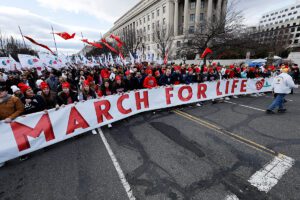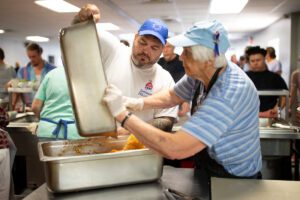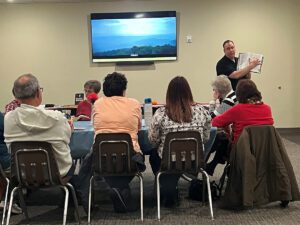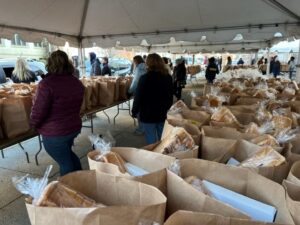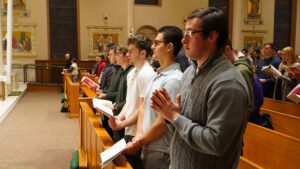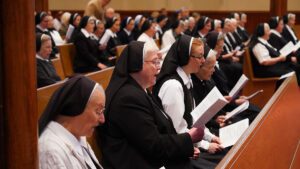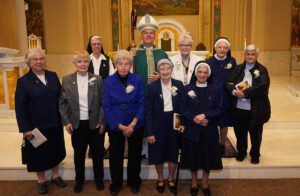BALTIMORE (OSV News) – For two days, the U.S. Conference of Catholic Bishops met in plenary assembly in Baltimore advancing key issues related to liturgy, living out the faith, including in the public square, and retooling the conference to better serve the church’s mission.
However, the bishops’ Nov. 13-16 meeting, which took place nearly three weeks following the conclusion of the global Synod on Synodality, also concluded without a common game plan for how bishops could get consultative feedback from their local parishes with respect to the synod’s “halftime” report before it reconvenes in 11 months.
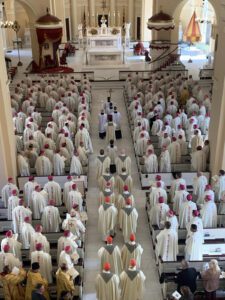
At the assembly’s opening Mass Nov. 13, the bishops prayed for peace, with USCCB president Archbishop Timothy P. Broglio of the U.S. Archdiocese for the Military Services in the homily saying they asked for wisdom to help others embrace Jesus Christ, and noting the feast day of St. Frances Xavier Cabrini, the first American saint, and herself an immigrant who championed care for immigrants.
The public portions of the bishops’ plenary assembly Nov. 14-15 were marked with extraordinary unanimity as the bishops’ closed-door “fraternal dialogues” gave them time for face-to-face group discussions to work out contentious issues in advance of presentations and votes.
The bishops approved a letter to Pope Francis, affirming their shared concern over global conflicts, his teaching on “ecological conversion,” and their commitment to prayerfully reflect on the Synod on Synodality synthesis report.
In their addresses, Cardinal Christophe Pierre, the apostolic nuncio to the U.S., and Archbishop Broglio offered contrasting viewpoints on synodality. Cardinal Pierre focused on Luke’s Gospel account of the risen Jesus revealing himself to his disciples on the road to Emmaus as illustrating “precisely the synodal path in its essential elements: encountering, accompanying, listening, discerning and rejoicing at what the Holy Spirit reveals.” Archbishop Broglio shared his view that existing advisory structures in the U.S. church, both at the diocesan and national level, are examples of existing synodal realities to “recognize and build on” while remaining open to “new possibilities.”
Over Nov. 14-15, the bishops voted with overwhelming majorities on every issue: U.S. adaptations to the Liturgy of the Hours and liturgical drafts related to consecrated and religious life; national revised statutes for Christian initiation; and it also approved without controversy supplements to its teaching on faithful citizenship that reference Pope Francis’ 2020 encyclical letter “Fratelli Tutti” (“Brothers All”) while naming abortion as “our pre-eminent priority” among other threats to human life and dignity.
The U.S. bishops voted to support the sainthood cause launched by the Archdiocese of New York for Father Isaac Hecker (1819-1888), founder of the Paulist Fathers. They also endorsed an effort to declare St. John Henry Newman a “doctor of the church.”
The bishops voted to reauthorize their Ad Hoc Committee Against Racism for two more years, discern its future place in the conference structure, and change rules so retired Chicago Auxiliary Bishop Joseph N. Perry, who is African American, could continue leading that committee.
The U.S. bishops elected Archbishop Paul S. Coakley of Oklahoma City as secretary-elect of the U.S. Conference of Catholic Bishops, and also elected chairmen-elect for six committees – education, communications, cultural diversity, doctrine, national collections and pro-life activities – as well as bishops for the boards of Catholic Legal Immigration Network Inc., or CLINIC, and Catholic Relief Services, the U.S. church’s overseas relief and development agency.
A surprise came when the bishops decided to punt approval of a pastoral framework for Indigenous Catholic ministry that they had commissioned four years ago in order to revise and revisit the plan at their June 2024 assembly.
Outside the hotel where the bishops’ assembly was held, the Baltimore-based Defend Life organization held a rosary rally led by Bishop Joseph E. Strickland. The event, however, was planned in advance of the bishop learning Nov. 11, just days before the assembly, that Pope Francis had removed him from pastoral governance of his Diocese of Tyler, Texas. About 125 participants, including some clergy and religious, participated.
Bishop Strickland told reporters, including OSV News, that he was told by “the nuncio” – indicating Cardinal Christophe Pierre – not to attend the fall plenary meeting. He said he “respected” the decision,” as well as his “commitment to be here for this prayer.”
Back in the bishops’ assembly, the prelates heard an update on the National Eucharistic Revival revealed attendees of the National Eucharistic Congress July 17-21 in Indianapolis now have the option of purchasing single-day and weekend passes, among other provisions to make participation more affordable and flexible, including scholarships and increasing housing options. A plenary indulgence also will be available to anyone who participates in one of the four main routes of the national pilgrimage to the Eucharistic congress.
The bishops also heard an update on the newly launched Institute on the Catechism. Some bishops advocated that instituting lay men and women to the new ministry of catechist would fill a need for authentic, well-formed witnesses to bring that “evangelizing catechesis” to others.
The bishops most sustained public dialogue took place over the mental health campaign launched in response to the “dire mental health crisis” in the U.S. with some bishops calling for more Catholics to enter the mental health field, educating seminarians and priests in properly referring people for counseling, or connecting people with mental health resources similar to the “Walking with Moms In Need” initiative.
With respect to the Oct. 4-29 Synod on Synodality, the bishops heard about positive experiences from some of their delegates, particularly the value of the synod’s “conversations in the Spirit” as a model for carrying out regular conversational interaction among the church’s members for the sake of the church’s mission.
However, by the time the plenary assembly concluded, the bishops did not seem to have any definite process or task force to help them engage the faithful in consultation on the synod’s 41-page report summarizing the body’s consensus, matters for consideration and priority actions.
During a Nov. 14 press conference, Bishop Flores told OSV News he anticipates it will be discussed in June once bishops have taken the time to “let it sink in and read it carefully.” He said what the USCCB could do immediately was request guidance from the Synod Secretariat in Rome, on how to engage their local churches in a focused and relevant way “because the first responsibility of the bishops is to go back to their own people and to say these are some issues that impact us in particular.”
He indicated a synodal culture needs to take root in the local church first – noting parish or diocesan pastoral councils are not used in some places since they are not mandatory – in order to discern what structures are needed to support it at all levels of the church.
The bishops’ showed a move toward deepening that kind of engagement by replacing the USCCB’s current strategic planning cycle with a mission planning process that would allow the conference to have defined regular responsibilities and the flexibility to focus on “mission directives that evolve after a process of discernment” that can be informed by bishops engaging in local and regional consultation.
“I think it is more synodal,” Archbishop Broglio said in an interview with OSV News, “and I think that will be something that will make a difference in how we address issues and concerns of the church in the United States in a different way, in a new way.”

